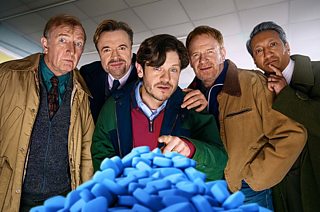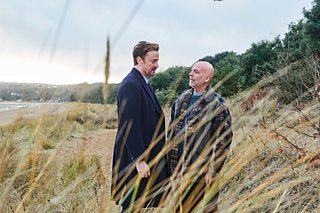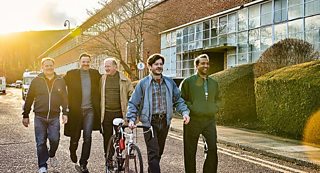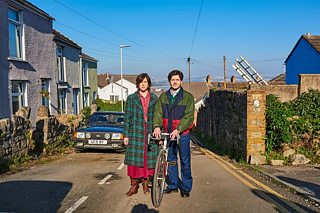Writer Matthew Barry introduces Men Up - his one-off drama about the 1994 Swansea-based trials of the drug Viagra and their effect on the people involved.
Watch Men Up on ±«Óãtv One on Friday 29th December at 9pm and on ±«Óãtv iPlayer
Watch the trailer for Men Up
Matthew, Can you tell us a little bit about how you got involved with Men Up?
Yes, I received a two-page fact sheet from , laying out that one of the first medical trials in the world happened in Swansea in 1994 and asking whether I would be interested in adapting this as a drama. I was quite busy at the time, so I said to myself, “Well, this is the last thing that I need right now, to read another document!" But then as soon as I read it, I thought, “OK, I have to do this. Why hasn't this been done before?” My first thought was that it's the Full Monty with Viagra. I just thought, “This has to be a drama”.
So it wasn't a story that you'd heard about before?
No, I had no idea that this happened in real life.
What research did you have to do subsequently?
I spoke a lot to Doctor David Price, who is the actual doctor who ran the trial, and who still lives in Swansea. He just retired last year, and he is a brilliant storyteller. Obviously, because of patient confidentiality, we couldn’t talk about specific individual patients. All the stories in the drama are fictionalised. But what was brilliant was just getting the stories of the time. The mad stories that you couldn't make up.

Colin White (STEFFAN RHODRI), Tommy Cadogan (PAUL RHYS), Meurig Jenkins (IWAN RHEON), Eddie O’Connor (MARK LEWIS JONES), Peetham ‘Pete’ Shah (PHALDUT SHARMA) in Men Up (Credit: ±«Óãtv/Quay Street Productions/Aiistair Heap)
What kind of stories?
Things like that Pfizer had FedExed him over the porn to use in the trial on VHS. And after his kids were in bed and he switched on the video he realised it was pretty crap and, you know, it wouldn't do! So, he called Pfizer and said, "look, this is not very good. I don't think this is going to going to work". And they said, "Well OK then go and buy your own porn". And because, you know, being a fine upstanding gentleman of Swansea, he kind of fled in the middle of the night with his wife to Newport to a sex shop to buy the porn in Newport. So, he would tell us all these stories and it was just incredible. And, you know, a lot of the stuff we didn't have the time to put in the film, but talking to David Price, the doctor who ran the trial was invaluable.
One of the first big things I came across was the ‘Viagra myth’. A lot of men take Viagra and they think once they take Viagra and it works that all their problems are going to go away, but invariably that doesn't happen. So I wanted to be truthful to that as well. I also learned that gay men weren't allowed on the trial. So I thought, what would it look like if a gay man tried to get on the trial? And so, those stories and ideas were the genesis for the fictionalised men in the drama.

Tommy Cadogan (PAUL RHYS), Rhys Lancey (NATHAN SUSSEX) in Men Up (Credit: ±«Óãtv/Quay Street Productions/Tom Jackson)
Was that a challenge when you were trying to translate the story to the screen?
Not really, in fact it was kind of freeing to go, well, these were the types of men on the trial, these were the challenges they faced. And then to take that and run with it.
We adhered very much to the framework of the trial. So, the different kind of pills they had, whether that was a placebo or the real thing, a double blind trial. But then within that framework, to fictionalise those men was actually really freeing rather than oppressive or daunting.
So how did you discover your five key characters?
I'm from Cardiff, just down the road from Swansea, so I know how these men talk and their rhythms and I was able to write that authentically. But it was also important to show a cross-section of people. So for one person on the trial, I said, well, I want the drug to work and it's really good. And then for another character, I thought, well, I want it to be more complicated and the drug works, but actually it's not going to solve the kind of problems they’re experiencing in their marriage. And then, as I said before, I wanted to include a gay character and I thought if one was a little bit more middle class, that's interesting.
The mid-nineties feel like ten years ago, but it really was another time, you know. here and in America, . So I was just trying to explore a broad cross-section of characters, but predominantly working class, and all Welsh. It was such a joy to talk, to write and write these characters in their authentic voices.

Eddie O’Connor (MARK LEWIS JONES), Tommy Cadogan (PAUL RHYS), Colin White (STEFFAN RHODRI), Meurig Jenkins (IWAN RHEON), Peetham ‘Pete’ Shah (PHALDUT SHARMA) in Men Up (Credit: ±«Óãtv/Quay Street Productions/Tom Jackson)
How important is Swansea as a location?
Swansea looks incredible on screen. Dylan Thomas called it an ugly, lovely town and called it a . You have the sweeping coastline, the beach and it's just stunning. And then in the background, you have the industrial Port Talbot steelworks. This story really happened in Swansea. This drug, which came from this trial is now known pretty much by literally every adult on the planet. So, it was important to honour that. Also just seeing Swansea on screen is brilliant. The opening shot is a drone shot over Swansea. It just looks incredible.
What do you hope people will take away from having watched Men Up?
What I hope people take away is, is that it's OK to talk. This is a drama about the first Viagra trial in the world, but actually it's really a story about mental health and communicating. It's about a group of men who are unable to talk to their partners or to their friends about what's happening to them. And by the end of the film, most of them, if not all of them, are able to do that. And for me, at its heart, that's what it's about. So what I would like people to take away, is that, whether we're talking about erectile dysfunction or mental health, men's mental health especially is still a taboo subject. So, if the audience can come away thinking, well, these five men can end up sitting around talking about what's bothering them, maybe I can do that with my friends as well?
Watch a clip from Men Up. In a local pub, a few pints down Meurig, Eddie, Colin and Pete chat about the trial.
What was your pathway to becoming a professional screenwriter? When did you first even think that was a possibility and what did you do about it?
I was an actor when I was a teenager, and then detoured into reading History and Politics at university and then took another weird detour to get my toe into corporate law, which was just horrible and crazy!
But my proper route into the industry was ±«Óãtv Writersroom. I did the in around 2010 with . We had three months in the classroom. During that time we also wrote an episode of Doctors and then we were put on the shows, EastEnders, Casualty and Holby City, it was sink or swim. My first episode of primetime network television was EastEnders, which was just incredible. That was my pathway into the industry. And I always remind people that I didn't get on the Writer’s Academy the first year I applied but had to reapply.
Before that point were you writing TV spec' scripts or were you writing for the theatre?
Even when I was in uni interviewing to be a corporate lawyer, and that process was ongoing, I knew I didn't want to do it. So, I wrote a script, I pitched a script about a character who was, (you might wonder where this came from!) choosing between a life of law and a life of being an actor. But it was much more fun than it sounds! It was called Friends of Dorothy, and it was set in London. I didn't have a clue what I was doing. I had no idea. But I wrote it and I sent it to , who I had worked with as an actor years ago, but hadn't heard from or spoken to since, and incredibly she came back to me. She'd read it, and she said, “I love it, I'd love to make it”. But it never got made! Actually an element of it became the episode of I wrote for Nicola and many years later, but that gave me the confidence to go, “Actually, I'm not going to be a lawyer, I'm going to pursue writing". So for the next two years, I was writing stuff on spec and eventually got on the ±«Óãtv writers’ scheme. But I always say if it wasn't for Nicola Shindler, I’d be a corporate lawyer. So thank goodness for that!

Ffion Jenkins (ALEXANDRA ROACH), Meurig Jenkins (IWAN RHEON) in Men Up (Credit: ±«Óãtv/Quay Street Productions/Tom Jackson)
Are there any shows that you're particularly proud of writing?
I'd have to say that first episode of EastEnders, which was really special because, you grow up with EastEnders and that writing credit at the end, it's so iconic. So that is a really special moment and just writing ‘Interior Queen Vic’ for the first time was incredible and also writing for , which I loved.
Then I moved to the USA in 2016 and started working more over there. I worked on , the Netflix show for three years and being in a big American writers' room was both brilliant and terrifying. So that was another pivot point.
How would you compare working as a screenwriter in the US to the UK?
It's completely different in Hollywood, in L.A on a show like Sabrina with a big traditional American writers’ room. Even though it’s called a writers’ room not much actual writing happens. Actually it's a lot of talking and pitching. And that is a completely, completely different skill-set. To sit around a table with fifteen people and pitch stories and talk about stories is a completely different thing to sitting in your room alone crying into a computer! So it took me around six months to get up to speed and learn how to verbally pitch stories and keep up with the system.
Do you think that feels unnatural coming from our more reserved British culture?
It's very different, but for me the most reassuring thing was that I had done a lot of Casualty and we did a kind of Casualty mini writers-room for our episodes. In essence the conversations about story and character are completely the same. There's no secret formula. The only real difference is money and the ability to keep those fifteen writers in a room while you're talking about episodes. So with Casualty, there would be, I think, four writers. We could each have a morning or afternoon to talk about our episode, which was great, but would not be enough time for a show like Sabrina. There we would do nothing for two weeks but talk about the episode that we were breaking. Essentially that comes down to budget. But the actual conversations about story and character were exactly the same.
What's the most useful advice you've received on your writing journey?
The two pieces of advice I like the most are that it's a marathon, not a sprint and rewriting is easier than writing.
So, I still do this today. I will write the scene in its worst kind of basic form. For example,
“I hate you.”
“I hate you.”
“Let's get divorced.”
“Okay”
Just so it's on the page and then I can keep going back and rewriting that because I have something set down, even if it's absolutely rubbish.
If anybody saw that ‘vomit’ draft of my script I'd never work again, but there's something on the page to work with. That feels manageable. Whereas if you're staring at a blank page, that can be overwhelming. So just get something, anything, down and then keep rewriting.
Watch Men Up on ±«Óãtv One and ±«Óãtv iPlayer from 9pm on Friday 29th December
